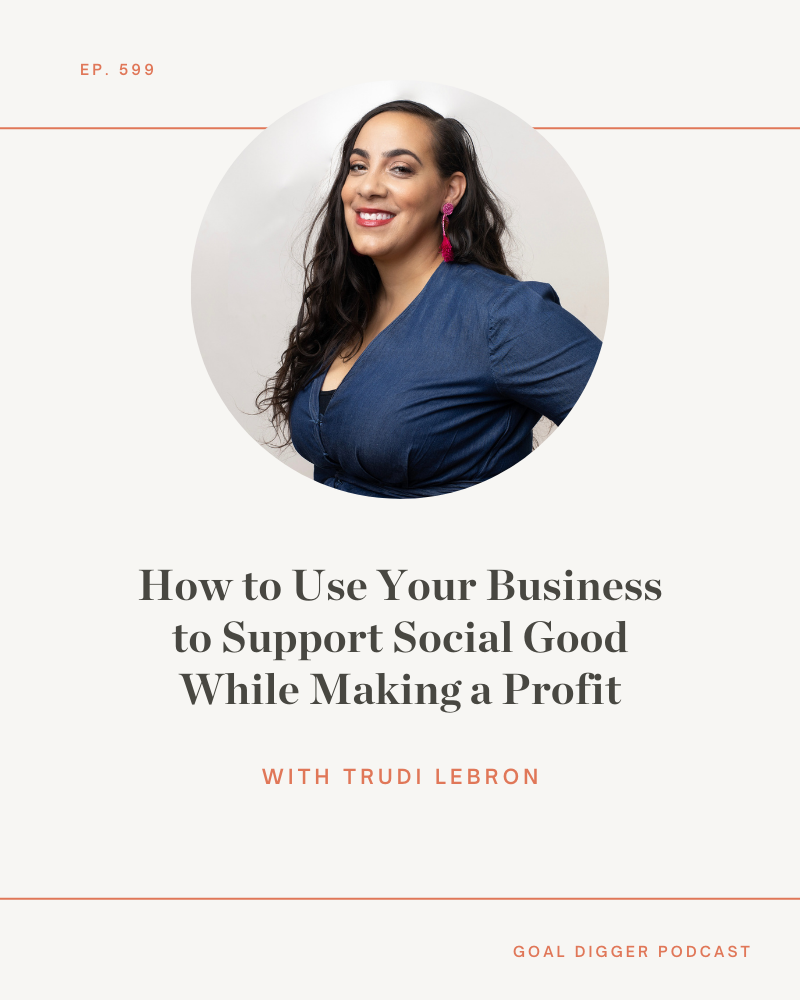
Apple Podcasts | Spotify | Stitcher
Our world is at a crossroads of crises – a lingering global pandemic, women’s rights at risk, our climate in a downward spiral, a fight for equity and racial justice… The list goes on. I don’t list these things off to bring you into gloom-and-doom territory, but rather to set the stage for a positive conversation about what YOU and your business can do about everything happening around us right now. You CAN make a difference all while running a financially successful business.
By the time Trudi Lebron was 16, she had two children and had dropped out of high school—all the odds were against her. Today, Trudi runs a million-dollar coaching and consulting firm, helping entrepreneurs and coaches build antiracist businesses and become equity-centered coaches and leaders. She is the CEO of ScriptFlip! and creator of the Institute for Equity Centered Coaching. And right now, Trudi is on the Goal Digger Podcast to talk about leading an equity-centered and values driven business, justice-based commerce, and all the ways you can contribute to the social good while still pursuing profits with your company.
What is equity centered coaching?
“Equity centered coaching is our proprietary approach to coaching and is a method and philosophy of coaching that basically puts the coach practitioner in a position and gives them the skills that they need to support people through all different kinds of transformations and really anchor their skill in conversations around identity, anti-oppression, and personal growth that is impacted by systemic inequities,” Trudi explained.
“That’s something everyone kind of faces, right? We all internalize narratives that come from the world about who we’re supposed to be and those things are really influenced by power and inequity and historic inequity. Our coaches who learn equity centered coaching are really wanting to be able to serve people and hold a wider context for their life.”
Trudi shared that during her time in the non-profit world and doing a lot of racial equity work and anti-racism training, she identified that one of the predictors in someone’s life outcomes are race and zip code. She explained, “My position and the position of equity centered coaching and all of the work that we do is that if someone is in the business of transformation, of supporting the transformation of other people, and they don’t have an understanding of how things like race, zip code, and ethnicity are really dominant influences in someone’s life, your practice is missing a really key component.”
Toxic Capitalism
Trudi dug into these concepts in our conversation. Here’s a snippet of our discussion, beginning with what she learned when researching the origins and concepts of capitalism. She shared, “What I realized is that the biggest challenges with capitalism are the extremes – the people who have billions and billions of dollars and are not taking care of their employees well and have hostile work environments and are not paying people equitably and taking advantage of people and all the exploitation.”
She continued, “There are lots of parts of capitalism that are hugely problematic and I call those things toxic capitalism. I want to separate those more insidious components of capitalism from just the ability for someone to open a business on their own and set their own rates. We can do that because we have a capitalist economic system, right? The reason that I can have a business, in the way that I have it is because we have a capitalist economic system.”
“I think that there’s a lot of folks who talk about anti-capitalism as the idea that we all need to be moving towards and I really wanna challenge us to think about that because anti-capitalism is not inherently anti-racist,” Trudi explained.
Justice Based Commerce
In contrast to toxic capitalism, there’s justice based commerce. Trudi explained, “My core intent is to live in a world where people’s life outcomes are no longer connected to their race and zip code. I think that justice based commerce, which is the idea that the exchange of money and goods and services can still exist in an economy that is capitalist, but we have a lot of work to do on the policy side so that we don’t have the kind of exploitation and oppression that happens.”
In her book, The Antiracist Business Book, Trudi helps people see the differences between the policy side and the toxic elements of capitalism that perpetuate inequity and poverty, but that we don’t have to throw the whole thing away because there are some parts of it that are worth salvaging, and that actually might have some solutions for us to be contributing to more economic equity.
More from Trudi Lebron
Do you want to learn more about justice based commerce and running an antiracist business in a capitalist economy? Press play on this conversation and be sure to pick up Trudi Lebron’s book, The Antiracist Business Book, for her teachings on the topic.




